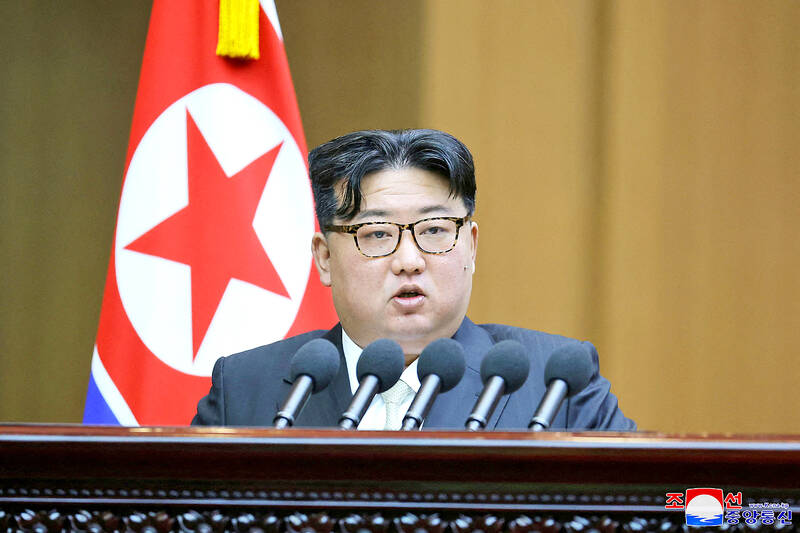North Korean leader Kim Jong-un threatened South Korea with war if “even 0.001mm” of the North’s territory is violated, as Pyongyang abolished agencies that oversaw cooperation and reunification, state media said yesterday.
Kim also said Pyongyang would not recognize the two nations’ de facto maritime border, the Northern Limit Line, and called for constitutional changes allowing North Korea to “occupy” Seoul in war, the Korean Central News Agency (KCNA) said.
In Seoul, South Korean President Yoon Suk-yeol told his Cabinet that should nuclear-armed North Korea carry out a provocation, South Korea would hit back with a response “multiple times stronger,” pointing to his military’s “overwhelming response capabilities.”

Photo: KCNA via Reuters
The hawkish rhetoric on both sides of the border follows a sharp deterioration of inter-Korean ties, with Pyongyang’s spy satellite launch in November last year prompting Seoul to partially suspend a 2018 military agreement aimed at defusing tensions.
Pyongyang’s decision to jettison the agencies charged with overseeing cooperation and reunification with South Korea was announced by North Korea’s rubber-stamp parliament, KCNA said, part of a string of measures that have escalated tensions, including live-fire artillery drills and missile launches.
In a speech delivered at the Supreme People’s Assembly, Kim called for the drawing up of new legal measures to define South Korea as “the most hostile state,” KCNA reported.
“In my opinion, we can specify in our constitution the issue of completely occupying, subjugating and reclaiming the ROK [Republic of Korea] and annex it as a part of the territory of our Republic in case a war breaks out on the Korean Peninsula,” Kim said.
“If the Republic of Korea violates even 0.001mm of our territorial land, air and waters, it will be considered a war provocation,” he said.
The decision comes shortly after Kim labeled South Korea the “principal enemy” and stated that continuing to seek reconciliation was a “mistake.”
In their constitutions, both North and South Korea claim sovereignty over the whole of the Korean Peninsula.
The Democratic People’s Republic of Korea and the Republic of Korea — the North and South’s official names — were founded 75 years ago, but still technically regard each other as illegal entities.
Until now, what passed for diplomatic relations were handled by the South Korean Ministry of Unification and the North Korean Committee for Peaceful Reunification — one of the agencies the Supreme People’s Assembly has now declared abolished.
Cho Han-bum, a researcher at the Seoul-based Korea Institute for National Unification, said that the North Korean system has long been grounded on the idea of reunification, an unachieved wish of the nation’s founding leader and Kim’s grandfather, Kim Il-sung.
“Now he is denying everything that his predecessors have done,” Cho said.
Pyongyang might be engaging in “mirror imaging,” responding to Seoul’s adjustments to the mission of the unification ministry to focus more on human rights issues.
“The Kim (Jong-un] regime is taking disproportionate steps in dismantling its inter-Korean organizations and formalizing a hostile policy line toward the South,” he said.

DEMOGRAPHICS: Robotics is the most promising answer to looming labor woes, the long-term care system and national contingency response, an official said Taiwan is to launch a five-year plan to boost the robotics industry in a bid to address labor shortages stemming from a declining and aging population, the Executive Yuan said yesterday. The government approved the initiative, dubbed the Smart Robotics Industry Promotion Plan, via executive order, senior officials told a post-Cabinet meeting news conference in Taipei. Taiwan’s population decline would strain the economy and the nation’s ability to care for vulnerable and elderly people, said Peter Hong (洪樂文), who heads the National Science and Technology Council’s (NSTC) Department of Engineering and Technologies. Projections show that the proportion of Taiwanese 65 or older would

Nvidia Corp yesterday unveiled its new high-speed interconnect technology, NVLink Fusion, with Taiwanese application-specific IC (ASIC) designers Alchip Technologies Ltd (世芯) and MediaTek Inc (聯發科) among the first to adopt the technology to help build semi-custom artificial intelligence (AI) infrastructure for hyperscalers. Nvidia has opened its technology to outside users, as hyperscalers and cloud service providers are building their own cost-effective AI chips, or accelerators, used in AI servers by leveraging ASIC firms’ designing capabilities to reduce their dependence on Nvidia. Previously, NVLink technology was only available for Nvidia’s own AI platform. “NVLink Fusion opens Nvidia’s AI platform and rich ecosystem for

Taiwan Semiconductor Manufacturing Co (TSMC, 台積電) yesterday said it is building nine new advanced wafer manufacturing and packaging factories this year, accelerating its expansion amid strong demand for high-performance computing (HPC) and artificial intelligence (AI) applications. The chipmaker built on average five factories per year from 2021 to last year and three from 2017 to 2020, TSMC vice president of advanced technology and mask engineering T.S. Chang (張宗生) said at the company’s annual technology symposium in Hsinchu City. “We are quickening our pace even faster in 2025. We plan to build nine new factories, including eight wafer fabrication plants and one advanced

‘WORLD’S LOSS’: Taiwan’s exclusion robs the world of the benefits it could get from one of the foremost practitioners of disease prevention and public health, Minister Chiu said Taiwan should be allowed to join the World Health Assembly (WHA) as an irreplaceable contributor to global health and disease prevention efforts, Minister of Foreign Affairs Lin Chia-lung (林佳龍) said yesterday. He made the comment at a news conference in Taipei, hours before a Taiwanese delegation was to depart for Geneva, Switzerland, seeking to meet with foreign representatives for a bilateral meeting on the sidelines of the WHA, the WHO’s annual decisionmaking meeting, which would be held from Monday next week to May 27. As of yesterday, Taiwan had yet to receive an invitation. Taiwan has much to offer to the international community’s